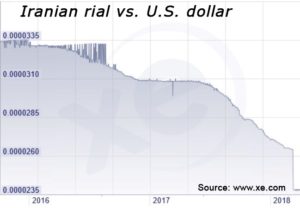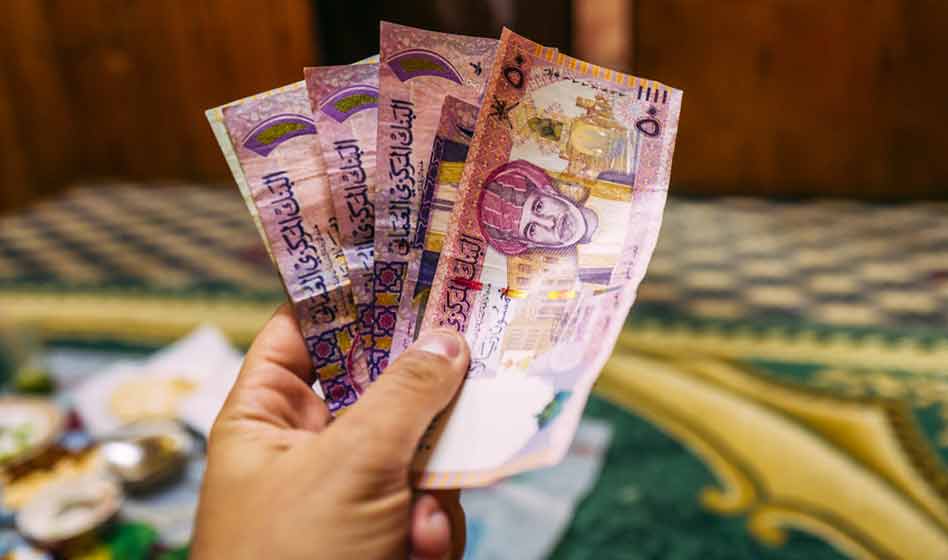This is a classic story of why cryptocurrencies will transform the world of money and banking.
The time is 2016, the place Iran. Months before President Donald Trump is elected, the Iranian currency, the rial, is already in the dumps. It’s worth only $0.0000335.
In other words, to buy a single U.S. dollar, you’d need 29,851 rials.
Months pass. Trump is elected. And he threatens to withdraw from the Iran nuclear deal.
In response, the rial’s plunge accelerates. It sinks precipitously to $0.0000264 on April 7, 2018.
It now takes 37,878 rials to buy one dollar.
 Then comes word from Washington that the Iran deal is almost definitely doomed.
Then comes word from Washington that the Iran deal is almost definitely doomed.
And on the very next day, the Iranian currency truly falls out of bed, crashing virtually straight down to $0.00002, or a flat 50,000 to the dollar.
This brings us to the present. We see:
Millions of Iranians panicking, terrified not only of renewed sanctions but also of economic collapse and financial repression…
Many desperately looking for any viable way to leave the country …
Many more scrambling to find safe refuge for the little money they have left.
Nearly all expecting Draconian capital controls.
Where to do they run?
Before cryptocurrencies were invented, the answer would have been gold or silver.
Today, it’s cryptocurrency. With its growing popularity and mainstream acceptance, this new money technology is emerging as a beacon of hope for those living in financial turmoil or under the dark cloud of strict capital controls.
If you’re caught in a similar crisis, all you have to do is change your local currency for bitcoin or another major currency, such as Ethereum. Then, once you have taken that simple step, you’re virtually free to trade with anyone anywhere in the world.
Once you’re in a cryptocurrency network, your money sits on a global distributed ledger that no central bank, government or sanctions can reach.
They cannot shut it down.
They cannot penetrate a system that, by its very nature, is decentralized, politically neutral and anonymous.
They cannot stop you from transacting with anyone else on the network, anywhere on the planet.
Nor can they stop you from exchanging your crypto back to dollars, euros, yen or the fiat currency of your choice. There are always plenty of people in the world who would gladly exchange their fiat for your crypto.
Historians of the future may look back at financial crises like Iran’s and see them as a blessing in disguise.
Crypto newbies and veterans alike often ask what catalyst would be needed for cryptocurrencies to gain mass adoption.
We would argue that it’s just a matter of time.
As corrupt governments around the world pursue their vicious habit of seizing assets, imposing capital controls and printing their own fiat money into worthlessness, more and more people will simply opt out.
They will leave the murky world of traditional finance and migrate to a new system where rules are transparent, fair, open, neutral and predictable.
That’s what’s been happening in Venezuela as citizens flee to cryptocurrencies. And it’s what’s also happening in Iran as the rial collapses. A growing group of people are exiting the system and exploring cryptocurrencies as the only viable alternative.
Once they overcome the hurdles of the new technology, they feel the freedom. They taste the privacy. They see the great profit potential. And they vow never to return.
Whether you fear instability in U.S. money and banking or not, you might want to consider doing the same — at least for the portion of your money that you can afford to set aside for protection in a potentially turbulent future.
Best wishes,
![]()
Martin D. Weiss, Ph.D., and Juan Villaverde




